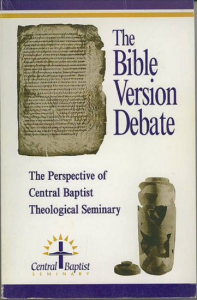
Author: McLachlan, Douglas
Genre: Theology - Bibliology
Tags: Bible, Modern Authors / Theological Issues
Series:
Rick Shrader‘s Review:
Reading Dogged Issues During Dogged Days
From The August 1997 Issue of Aletheia.
The habit of reading is absolutely critical today, particularly for Christians. As television turns our society into an increasingly image-dominated culture, Christians must continue to be people of the Word. When we read, we cultivate a sustained attention span, an active imagination, a capacity for logical analysis and critical thinking, and a rich inner life. Each of these qualities, which have proven themselves essential to free people, is under assault in our TV-dominated culture. Christians, to maintain their Word-centered perspective in an image-driven world, must become readers.
Gene Edward Veith, Jr.1
This is the time of year when a rocking chair, a glass of lemonade and a good book may be all the exercise one can take. But it also seems to be the time of issues, boycotts, resolutions and conflict within many bodies of believers. Maybe it’s just the sultry weather that makes us all irritable and we’ll all cool down eventually. Perhaps a vacation, a little time away and some reflection on the issues is what we need. Vance Havner wrote, “It is good to get away from it all now and then, for we cannot run well in the midst of it all unless now and then we run away from it all.”2
This issue of ALETHEIA will depart somewhat from the usual format. I have been reading in a few various controversial areas and would like to respond to each of these. My study of these is certainly not complete but ongoing as must be the case with such things. By responding to particular books in these areas, I am not responding to everything that has been written or that I should have read by now. However, when a book is published you figure that the author has said all that he wanted to say about the subject and so comments about it are justified.
————————
3. The Bible Version Debate
I was very glad to see a Baptist Seminary, known for its fundamental and conservative position, publish a straightforward, scholarly position on this divisive issue. The Bible Version Debate is written and published by Central Baptist Theological Seminary in Minneapolis, MN. The chapters were written by President Douglas McLachlan and three professors. I especially enjoyed reading the book because Central is my Alma Mater and these professors were classmates of mine.
The book begins with a quote from the late founder and president of the seminary, Richard Clearwaters, from his book The Great Conservative Baptist Compromise, “Honesty compels us to cite the 1901 American Revised as the best English Version of the original languages which places us in a position 290 years ahead of those who are still weighing the King James of 1611 for demerits.” Also, “We know of no Fundamentalists . . . that claim the King James as the best English translation. Those in the main stream of Fundamentalism all claim the ASV 1901 as the best English translation.” That sounds amazingly like my old college professor, Noel Smith who used the ASV 1901 in class at Baptist Bible College.
I personally agree with the conclusions of this book. I have never been a majority Text or Textus Receptus fan. Although I grew up hearing Pete Ruckman speak at my church, I was not taught a KJV Only position at church, at Baptist Bible College (68-72), at Central Seminary (72-75) or at the GARBC seminary I attended (82-84). As Dr. Clearwaters’ quote points out, the KJV Only position is a recent intruder into Fundamentalism.
There are a few valuable contributions that this book from Central Seminary makes to the overall discussion. 1) Roy Beacham, professor of Old Testament, points out the inconsistencies of the Old Testament texts, specifically the Masoretic Text. It is wrong merely to assume that all Old Testament texts agree. 2) W. Edward Glenny, professor of New Testament, shows the unreliability of the Textus Receptus, especially when arguing for divine preservation. 3) Glenny has an excellent chapter on Biblical preservation and the misuse of “preservation texts” by KJV Only advocates.
The seminary’s position on Bible translations is set forth in three criteria for what can be called the Word of God. “They must be (1) translations, (2) nonsectarian and (3) made from the original language manuscripts. We can be confident that any nonsectarian translation of manuscripts of the original languages is the Word of God” (p. 119).
This book is a welcomed step for Baptists to return to their roots as Bible believing people.
